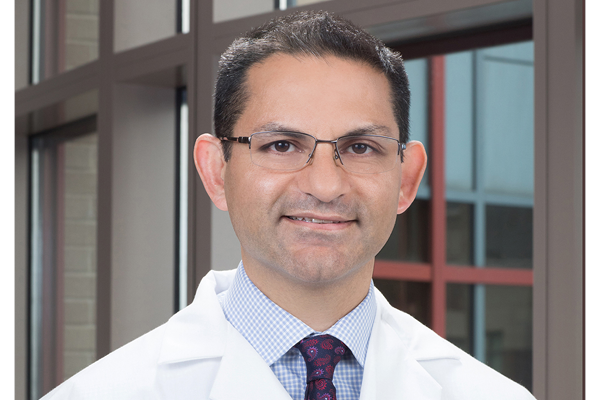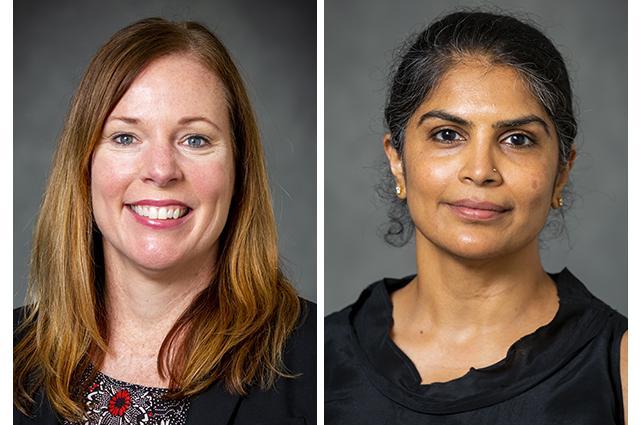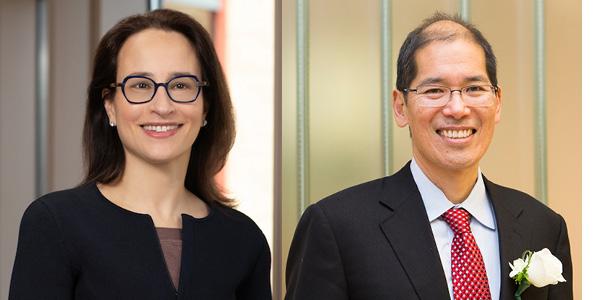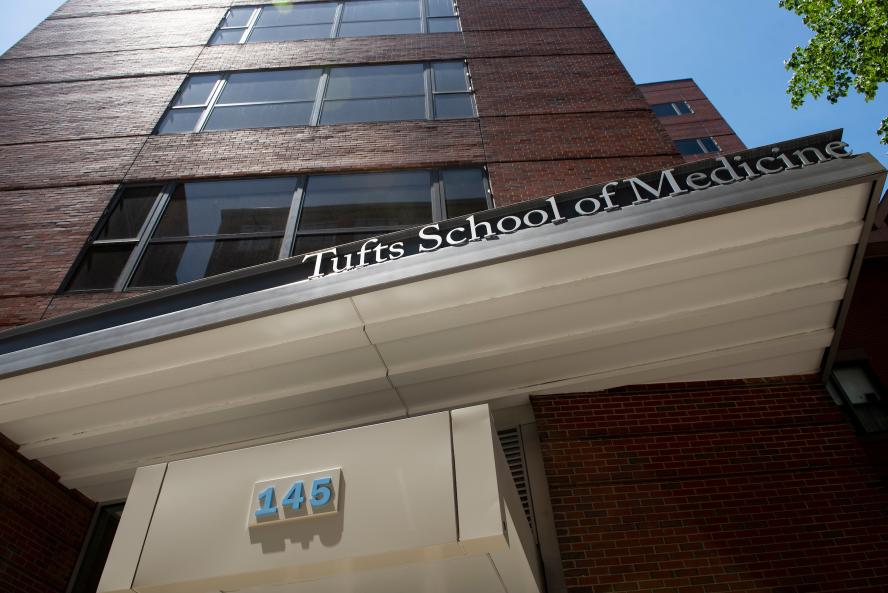
Navin Kapur Awarded the Zucker Family Prize for Outstanding Research Career
This award is given in recognition of exceptional achievements in basic, translational, and clinical sciences.
Tufts University School of Medicine is committed to supporting the research and academic endeavors of its community. As part of this commitment, the university offers a variety of internal funding opportunities to help faculty pursue their research goals and advance the frontiers of knowledge.
By supporting research, Tufts is contributing to a better understanding of the world and helping to address some of the most pressing challenges facing society today. Interested individuals may explore further internal research funding opportunities available at Tufts University here.
The Natalie V. Zucker Research Center will be accepting applications for its twenty-seventh annual grant awards cycle. Established through the generosity of Mrs. Natalie V. Zucker, the Center is devoted to furthering the research careers of junior basic and clinical scientists at Tufts University or the major Tufts-affiliated hospitals.
Eligibility
Candidates must be engaged in basic, clinical, translational, or educational research related to medicine and human health at Tufts or the major Tufts-affiliated hospitals. The research project must align with at least one of the five pillars of the TU-TM Research Enterprise: Brain and Behavior; Cancer Biology, Care, and Survivorship; Cardiovascular Disease and Critical Care; Transplant Immunity and Infection; and Women’s Health, Nutrition, and Sex Differences. Junior faculty, postdoctoral fellows, and residents are eligible. Junior faculty are considered to be those with eight years or less since the first faculty position. The applicant's mentor or Department Chair must support the request. Previous awardees as well as faculty members who are already principal investigators on R01 or equivalent grants or who have financial start-up packages for their laboratory are ineligible. Applicants do not need to be US citizens or residents.
Amount and Duration of Award
Individual awards of up to $10,000 will be given for research projects, up to $5,000 for travel and training to further the applicant’s research career, or a combination award of research, travel and training not to exceed $10,000. The grant period is one year, with the earliest start date being July 1, 2026. Funded proposals should be completed and all expenditures incurred by no later than June 30, 2027 unless extension of a project period is formally approved.
Nature of Request
Applicants may request support for items or activities that will advance and benefit the applicant's own research career and professional stature. Examples include purchasing a scientific instrument or services such as Next-Gen sequencing for your direct research; attending a research meeting; defraying tuition for scientific courses, career development or an additional degree; launching a pilot project; establishing a new research collaboration; or providing partial salary support for a research assistant. For the training options, we will also consider applications for career coaching such as the NCFDD Faculty Success Program or skills development such as grant writing. Funds may not be used as salary support for the award recipient.
Selection Criteria
Selections are based upon the following three criteria:
Application Process
Please submit a PDF of the application that includes:
Arrange to have a letter of support from your mentor or department chair (to be sent separately).
The Face Page form can be found here and the instructions for completing the application here.
The deadline for submission of applications is Thursday, April 17, 2026. Questions? Call (617-636-6565) or email Isaac.Harmon@tufts.edu.
This internal funding opportunity (up to five grants, each approximately $10,000 for 1 year with a single, one-year no-cost extension available upon request) is intended to support projects which are likely to lead to extramural funding from public or private sources of support. Where proposals are of equal merit, priority will be given to new investigators at the beginning of their career. Eligibility is restricted to all Tufts University School of Medicine faculty whose total extramural support (direct costs excluding PI salary and fringe benefits) does not exceed $100,000/yr. Previous recipients are not eligible. Funds may not be used to support the salary of the PI. Charlton grant applications are typically solicited once a year. Exact date for submission is determined by the Academic Research Awards Committee and is announced by the Dean's Office.
Tufts Springboard is an intramural grant program sponsored by the Office of the Provost, the Office of the Vice Provost for Research (OVPR), and Tufts Medicine. The goal of Tufts Springboard is to stimulate high impact research, scholarship and educational initiatives that have an explicit plan leading to extramural funding or other outcomes that influence research, scholarship, educational outcomes, and/or policy. Moreover, the Tufts Springboard program aims to further the priorities of the University and its schools and to fortify Tufts' status as a R1, very-high research activity university and member of the Association of American Universities.
This funding opportunity is made possible through a grant from the Russo Family Charitable Foundation Trust to Tufts University School of Medicine (TUSM). TUSM received a commitment of $250,000 from the Russo Foundation to support interdisciplinary collaborative research. The grant is being made in approximately equal installments over a five-year period. This internal funding opportunity is intended to stimulate collaboration which can later seek NIH funding through the new co-PI grant mechanism. Information about the new NIH funding mechanism can be found at here. Support of research assistants, purchase of equipment and supplies, and sponsorship of working retreats are eligible for such funding on a competitive basis by completing the application form. In most circumstances, salary for new personnel is not supported and PI salary cannot be supported from these funds. Historically, individual awards have ranged between $15,000 and $20,000. All TUSM faculty may apply provided that the collaboration involves at least one faculty member based in the Graduate School of Biomedical Sciences (GSBS).
Russo grant applications are typically solicited twice a year. Exact dates for submission are announced by the Dean’s Office. Those interested in finding out more information or applying may contact emailing Isaac.Harmon@tufts.edu.
The Tufts Launchpad | Accelerator (TLA) is a grant program funded by the University to address the greatest challenge in academic technology transfer, which is the funding gap – often referred to as the “valley of death” – between the end of federal funding of basic research and the beginning of commercial interest.
While Tufts innovators generate groundbreaking scientific discoveries in their labs, translating these ideas into useful products for the public benefit involves many additional steps and requires substantial funding. The goal of the TLA Program is to provide Tufts’ faculty with the ability to advance technologies invented at Tufts towards commercialization. The TLA Program will provide awardees with funding of up to $75,000 and business development support from the Office of Vice Provost of Research to facilitate product development and technology de-risking with the ultimate goal to attract follow-on resources and generate interest in licensing from existing companies or startups.
In response to the nation-wide crisis, Tufts Initiative on Substance Use and Addiction seeks to support programs aimed at the prevention and treatment of addiction and substance use.
Jointly funded by Tufts University and Tufts Medical Center, this initiative provides an opportunity for members of our clinical, research and scholarship community to generate bold ideas and innovate in the face of the complex challenges associated with the increase in substance use and addiction both locally and nationally. From the brain disease model to social programs that reduce stigma, increase civic engagement, improve education, and catalyze research, Tufts Initiative on Substance Use and Addiction offers a path to use our greatest resource—our expertise as a student-centered, patient-facing research university and hospital—to make a difference in the world around us.
Successful proposals will encourage, clinical interventions, community-based participatory research, civic engagement, and education programs aimed at the prevention and treatment of substance use and addiction. The goal of this initiative is to establish sustainable efforts using Tufts’ unique constellation of clinical expertise, research, scholarship and commitment to civic engagement, to help the countless individuals and families who have suffered as a result of the opioid crisis.
Learn more about Tufts Initiative on Substance Use and Addiction
The Milton O. Zucker, MD, FACS, and Natalie V. Zucker Award is awarded annually to a scientist on the Tufts University School of Medicine (TUSM) faculty for outstanding career achievements in research. The Zucker Family Prize is awarded annually to a TUSM faculty member for a career of outstanding research. As always, there was an exceptional pool of nominees making selection very difficult. For more information on these award, please contact Isaac Harmon at Isaac.Harmon@tufts.edu.
The Zucker Research Prizes were funded by Milton O. and Natalie V. Zucker to recognize research achievement by the faculty of Tufts University School of Medicine. Dr. Milton Zucker was a member of the class of 1930 of Tufts' medical school. The Zucker Family Prize was first awarded in 1989 and the Milton O. Zucker, M.D., F.A.C.S., and Natalie V. Zucker Award was first awarded in 1994.
The School of Medicine is excited to see the groundbreaking research that will be produced as a result of these initiatives and is proud to support the efforts of its community in pioneering new discoveries and innovations.

This award is given in recognition of exceptional achievements in basic, translational, and clinical sciences.
This award is given in recognition for exceptional career achievements in research.

Iris Jaffe and Saloni Dev from the School of Medicine among recipients of grants

Congratulations to the individuals and teams from the School of Medicine who were selected for awards

Congratulations to this year's recipients Jamie Maguire and Mali Raman
Learn about the individuals and teams from the School of Medicine who were selected for this award.

Four projects led by Tufts researchers have been announced as the recipients of the 2022 Tufts Launchpad | Accelerator (TLA) grants.

We are pleased to announce this year’s recipients of the Zucker Research Prizes. The prizes are awarded annually and are made possible by generous gifts from the Zucker family.

Congratulations to the individuals and teams from the School of Medicine who were selected for awards.